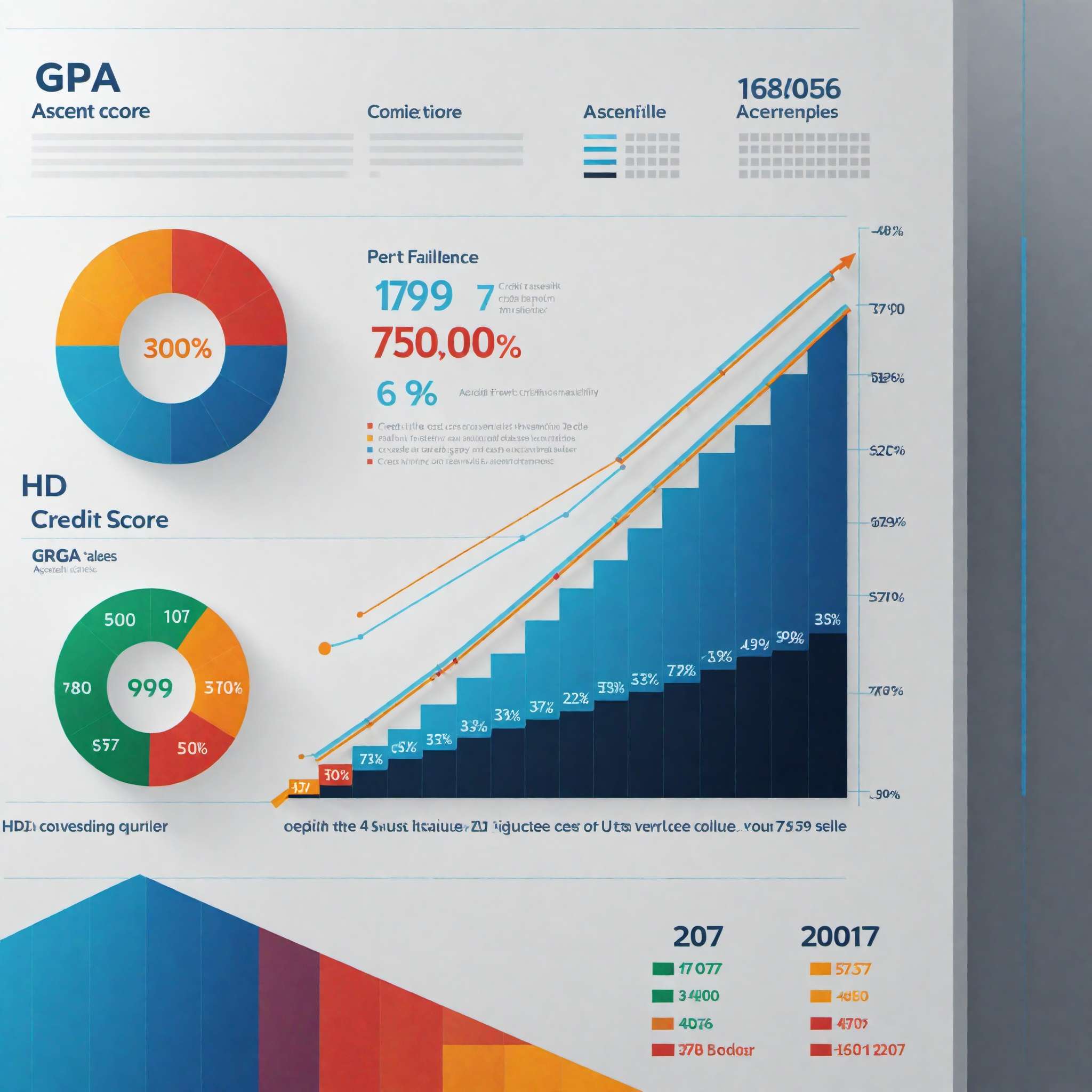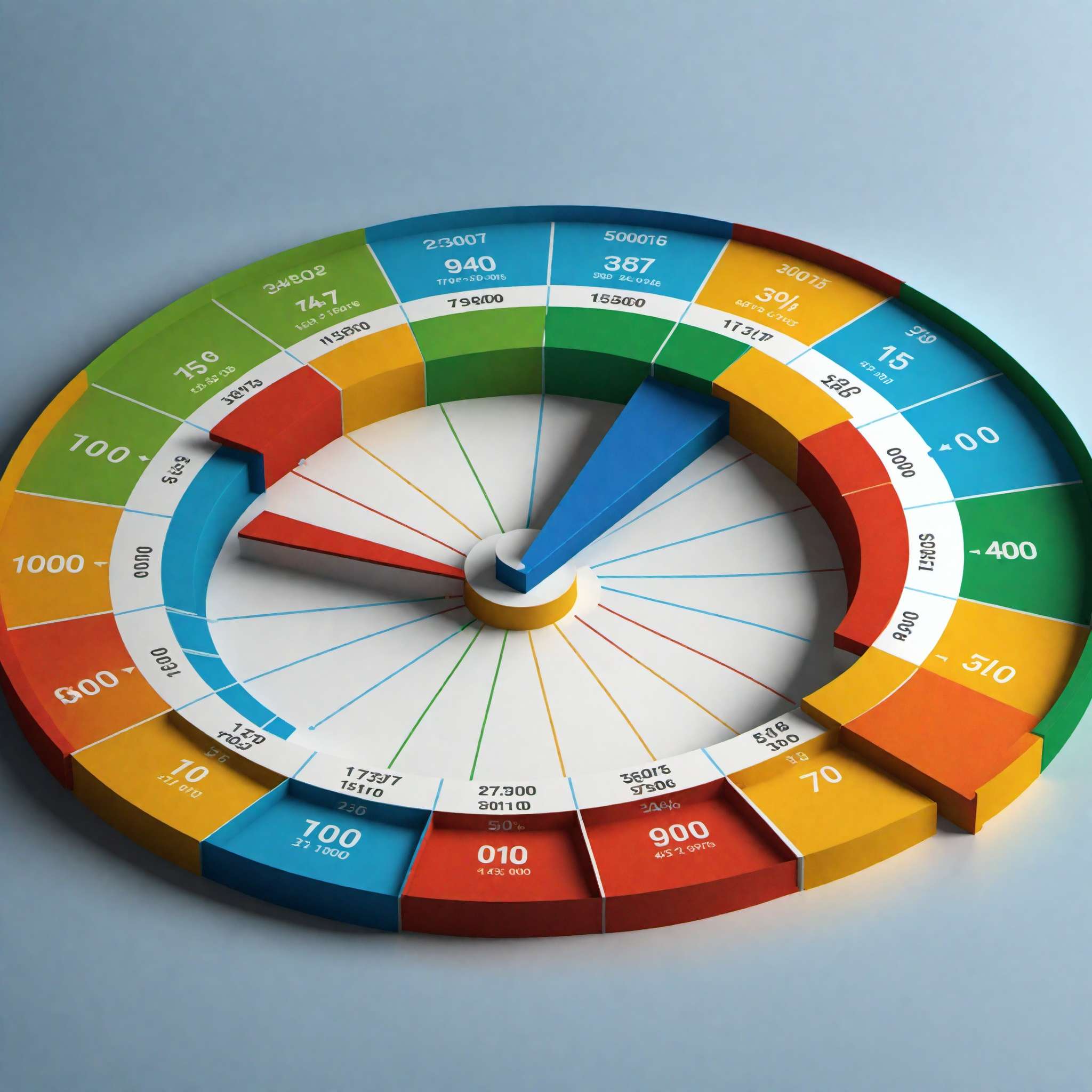Zombie Bunny is Reader-supported and may earn an affiliate commission through links on our site.

Why Your Credit Score Is More Important Than Your GPA
Why your credit score could be more important than your GPA. Real world lessons! #CreditScore #RealWorld
Navigating the academic journey and stepping into the real world brings two important numbers into focus: your GPA and your credit score. While a high GPA can open doors within academia, its influence often diminishes once you step into the professional world. Your credit score, however, holds long-term importance, influencing various aspects of life from securing loans to renting a house and even job prospects. This blog post dives deep into why your credit score is more important than your GPA and offers practical advice on managing both effectively. Stay tuned as we unravel the mystery of these two significant numbers and provide actionable tips to set yourself up for success.
Introduction: The Importance of Credit Score Over GPA

© Copyright , ZombieBunny.Org
Understanding the importance of credit score and GPA
In the pursuit of academic excellence, students often find themselves obsessively focused on their Grade Point Average (GPA). This number, however, is just one piece of the puzzle when it comes to setting the stage for future success. Enter the credit score – a number often overlooked by students, yet holds immense importance in shaping their financial future.
The world beyond the campus grounds operates on a different grading system, where your credit score becomes a key factor. It’s a numeric representation of your financial trustworthiness, which can open or close doors to numerous opportunities. From renting an apartment to landing your dream job, a good credit score helps you make a smooth transition into post-graduate life. On the other hand, a high GPA can open doors within academia, but its influence often diminishes once you step into the real world.
In a nutshell, while GPA is important during your academic journey, the importance of maintaining a good credit score extends much further into your life. In the upcoming sections, we will delve deeper into why your credit score is more important than your GPA, and how you can effectively manage both to set yourself up for success.
Defining GPA and credit score
Before we delve into the comparison, let’s define GPA and credit score. GPA, or Grade Point Average, is a metric used by educational institutions to measure a student’s academic performance. It’s a numerical representation of your grades, calculated over a certain period, usually a semester. A high GPA indicates strong academic performance, making it a key factor in college admissions, scholarships, and other academic opportunities.
On the other hand, your credit score is a numerical expression that represents your creditworthiness. It’s based on your credit history, including factors such as payment history, the amount of debt you have, and the length of your credit history. Credit scores are used by lenders, landlords, and sometimes employers to determine your reliability as a borrower or tenant.
In essence, while your GPA reflects your academic reliability, your credit score is a reflection of your financial reliability. Both are important, but they serve different purposes. In the following sections, we will explore why, in the grand scheme of things, your credit score can have a more significant impact on your life than your GPA.
Preview of upcoming content
As we navigate this discussion, we’ll delve into the importance of both GPA and credit score in their respective domains. We’ll compare their impact on various facets of life – from job prospects to financial stability. We’ll debunk some common myths and misconceptions, shedding light on why your credit score might be more important than you think.
We’ll explore the doors that a good credit score can open for you. From housing options to loan approvals, you’ll discover the far-reaching implications of this three-digit number. We will also reflect on the importance of GPA, discussing its role and significance in the academic sphere.
Furthermore, we’ll provide practical advice on how to build a good credit score while maintaining a solid GPA. From understanding your credit report to implementing smart money management habits, we aim to provide you with actionable tips to excel in both these areas.
In essence, this blog post will take you on a journey of understanding the long-term impacts of these two significant numbers in your life. So, stay tuned as we unravel the mystery and provide practical advice on managing your GPA and credit score effectively.
The Hierarchy of Numbers: GPA vs Credit Score

© Copyright , ZombieBunny.Org
Explaining the numeric system of GPA and credit score
To truly understand the importance of GPA and credit score, it’s essential to understand their numeric systems. The GPA is typically calculated on a scale of 0 to 4.0 or 5.0, with higher numbers indicating better academic performance. Each letter grade you receive in a course is assigned a numerical value (for instance, an A might equate to a 4.0), and your GPA is the average of these values weighted by the credit hours of the courses.
In contrast, credit scores are calculated on a scale from 300 to 850, with higher scores indicating better creditworthiness. This score is derived from your credit report, a detailed record of your credit history. It considers factors like payment history, amounts owed, length of credit history, types of credit used, and new credit inquiries.
While both GPA and credit score are numbers that represent your reliability in their respective domains, they’re calculated differently and serve different purposes. Your GPA is a reflection of your academic performance, while your credit score gauges your financial responsibility. Understanding these numeric systems is the first step towards appreciating why your credit score can have a more profound impact on your life than your GPA.
Understanding the hierarchy and importance of these numbers
In the hierarchy of importance, GPA and credit score hold different positions. During your academic journey, your GPA is a critical factor. It can determine your eligibility for scholarships, internships, and even certain job opportunities. It’s a measure of your commitment, hard work, and intellectual capability in the academic sphere.
However, once you step into the ‘real world’, the importance of GPA starts to fade. Instead, your credit score emerges as a more significant number. A good credit score can be a determining factor when you try to rent an apartment, apply for a loan, or even when you’re up for a job that requires financial responsibility. It’s a testament to your financial reliability and trustworthiness, with long-lasting implications.
The hierarchy of these numbers is context-dependent. While GPA holds significant importance in academia, its influence is limited and temporal. In contrast, a credit score follows you throughout your life, affecting diverse areas beyond just the financial sector. Understanding this hierarchy can help you prioritize your efforts and make informed decisions for a successful future.
The impact of these numbers on your future
The impact of your GPA and credit score on your future can be profound, albeit in different ways. A high GPA can pave the way for academic success, opening doors to internships, scholarships, and competitive graduate programs. It can boost your chances of landing your first job, particularly in fields that emphasize academic performance.
However, the influence of your GPA often diminishes as you move further into your career. Employers may place more emphasis on your work experience and skill set rather than your past academic performance. On the other hand, the importance of your credit score tends to increase over time.
A strong credit score can make it easier for you to secure a loan, rent a house, or even get a job, especially in sectors that require financial due diligence. It can influence the interest rates you’re offered on loans and credit cards, possibly saving you significant amounts of money in the long run. In fact, maintaining a good credit score is essential for achieving financial stability and independence.
In essence, while your GPA can have a significant influence on your early career, your credit score can impact a broader array of life aspects and its effects can be felt throughout your life. Balancing the importance of both these numbers is key to long-term success.
The Doors Credit Score Opens

© Copyright , ZombieBunny.Org
Benefits of a good credit score
A good credit score carries with it an array of benefits that extend far beyond the financial sphere. Among the most apparent advantages is easier approval for credit cards and loans. With a high credit score, lenders see you as a low-risk borrower and are more likely to approve your application. This can be particularly beneficial when you’re looking to make significant purchases like a car or a house.
Another significant benefit of a good credit score is lower interest rates. Lenders offer better, more favorable interest rates to those with high credit scores. Over time, lower interest rates can save you a substantial amount of money.
Beyond the realm of lending, a good credit score can also impact your housing options. Many landlords check credit scores during the tenant screening process. A high score can increase your chances of being approved for a rental.
Furthermore, some employers review credit scores, especially for positions that involve handling money or sensitive financial information. A good score can thus potentially boost your employability.
In essence, a good credit score opens numerous doors, providing you with a wider range of options and opportunities in various aspects of life. It’s a number that follows you throughout your life, making its maintenance an investment in your future.
Impact on employment, housing, and loans
A good credit score can significantly influence various aspects of your life, including employment, housing, and loans. In terms of employment, some industries, particularly finance and banking, might check your credit history as part of the hiring process. A high credit score can be an indicator of financial responsibility and reliability, making you a more attractive candidate for the job.
When it comes to housing, a good credit score can work in your favor in more ways than one. Landlords often conduct credit checks as part of the tenant screening process. A high score can increase your chances of securing the rental property you want. If you’re looking to buy a house, a good credit score can also help you secure a mortgage loan at a favorable interest rate.
In the lending world, your credit score is a vital factor that lenders consider when determining whether to extend credit to you. A good credit score can not only increase your chances of loan approval but can also secure you lower interest rates. This can save you a significant amount of money over the life of the loan.
In essence, your credit score plays a crucial role in many significant aspects of your life, from securing your dream job to buying your first home. Hence, maintaining a good credit score can open numerous doors and provide you with a wider range of opportunities.
Real-life examples
Let’s consider some real-life examples to understand the impact of a good credit score. For instance, imagine you are a recent graduate looking to rent an apartment. You find a place that’s perfect – it’s close to work, within your budget, and has all the amenities you want. However, the landlord conducts a credit check and finds that your score is low. Despite your steady income and excellent references, the landlord might choose another tenant with a better credit score, deeming them a less risky option.
Now, consider another scenario where you want to buy a car. You apply for an auto loan, and thanks to your high credit score, not only do you get approved quickly, but you also secure a lower interest rate. This can save you hundreds, if not thousands, of dollars over the life of the loan.
In the realm of employment, consider a job in a financial institution that requires handling sensitive financial information. A high credit score can boost your chances of landing the job as it signals to the employer that you are financially responsible.
These examples highlight how a good credit score can significantly impact various aspects of your life, emphasizing the importance of maintaining a high score. It’s not just a number, but a key that can unlock numerous opportunities.
Deconstructing GPA: Does it Really Matter?

© Copyright , ZombieBunny.Org
Understanding the importance of GPA in academic field
In the world of academia, the importance of GPA cannot be understated. It is a numerical representation of a student’s academic performance and is usually the first thing universities, colleges, and scholarship boards look at when considering an application. A high GPA can open doors to prestigious academic programs, scholarships, and internships.
For instance, many universities require a minimum GPA for admission into their programs. A high GPA can increase your chances of being accepted into competitive programs. Similarly, many scholarships require a certain GPA for eligibility, making a high GPA crucial for securing financial aid.
Moreover, internships, particularly those in competitive industries, often consider GPA when shortlisting candidates. A strong GPA can indicate a student’s dedication, hard work, and intellectual capacity, making them an attractive candidate.
In essence, your GPA plays a significant role in your academic journey. It can shape your educational opportunities and pave the way for your initial career path. However, it’s important to remember that while a high GPA can open doors within the academic field, its influence often diminishes once you step into the professional world.
The limitations of GPA
While the GPA holds significant weight in the academic realm, it’s not without its limitations. For one, the GPA is a quantitative measure and doesn’t necessarily reflect a student’s full range of capabilities. It doesn’t take into account factors like creativity, leadership skills, problem-solving ability, or teamwork, all of which are crucial in the professional world.
Furthermore, a high GPA mainly holds sway within the educational sector. Its influence tends to wane as you move into the professional sphere. Many employers place more emphasis on practical skills, work experience, and cultural fit rather than academic performance. In other words, a high GPA might get your foot in the door, but it won’t guarantee career success.
Moreover, a GPA is often seen as a short-term number. It’s highly relevant during your school years and shortly after graduation, but its importance generally decreases as you move further into your career.
In contrast, a credit score is a long-term number. Its impact can be felt throughout your life, affecting various aspects of your personal and financial life. Understanding these limitations can help put the importance of GPA into perspective and highlight why, in the grand scheme of things, your credit score may be more critical.
Real-world examples
To illustrate the limitations of GPA, let’s consider some real-world examples. Imagine a student with a high GPA who excelled in academia but lacks practical skills required for their desired job. Despite their excellent academic performance, they might struggle to secure the job or perform well once hired.
On the other hand, consider a student with a lower GPA but who has gained valuable experience through internships, part-time jobs, or extracurricular activities. This student might have a better chance of getting hired and succeeding in their job because they have developed practical skills and gained real-world experience.
Another example can be seen in career progression. A few years into your career, promotions and job changes are more likely to be based on your job performance, skills, and experience, rather than your GPA. At this point, your GPA becomes less relevant, and other factors take precedence.
Lastly, consider a scenario where you’re applying for a loan to buy a house. The lender is unlikely to ask about your GPA. Instead, they will be more interested in your credit score as it provides insight into your financial behaviour and reliability.
These examples underscore the fact that while a high GPA can provide a strong start, it is not the sole determinant of success in life. Other factors, like your credit score, can have a more long-lasting and far-reaching impact.
Credit Score: A Lifelong Companion

© Copyright , ZombieBunny.Org
The journey of your credit score
The journey of your credit score begins the moment you start engaging in financial activities that are reported to credit bureaus. This could be when you take out your first student loan, open a credit card, or even when you start paying utility bills. From this point onwards, your financial decisions – good or bad – contribute to your credit history, which in turn shapes your credit score.
Every timely payment you make, every debt you repay, and every wise financial decision you make can help improve your credit score. However, missed or late payments, high levels of debt, and other negative financial behaviors can cause your score to drop.
Unlike your GPA, which becomes less relevant over time, your credit score remains a critical part of your financial profile throughout your life. It evolves as you move through different life stages – from being a student, to starting your first job, buying a home, and even into retirement.
In essence, your credit score is not a static number but a dynamic one that reflects your financial behavior over time. It’s a lifelong companion that can either open doors to opportunities or close them, depending on how well you manage it. Hence, understanding its journey can help you make informed decisions to maintain a good score.
The long-term importance of a good credit score
Understanding the long-term importance of a good credit score is essential for financial success. A high credit score can make many aspects of life easier and more affordable. From securing a mortgage for your dream home to getting approved for a car loan, your credit score can make these significant milestones more attainable.
Moreover, a good credit score can save you money in the long run. With a high score, you’re more likely to secure loans and credit cards with lower interest rates. Over time, these savings can add up, providing you with more financial freedom.
In addition to loans and credit cards, a good credit score can also make it easier to rent a home, get a cell phone plan, and even secure certain jobs. It can impact various aspects of your life, from the financial to the personal.
Furthermore, maintaining a good credit score is also a matter of financial security. In times of emergency, a high credit score can make it easier to secure a loan quickly and on favorable terms.
In essence, your credit score is a long-term financial tool. Its importance extends far beyond your college years or early career, making it more critical than your GPA in the grand scheme of things. Understanding this can help you prioritize your financial health and set you up for a secure future.
Strategies for maintaining a high credit score
Maintaining a high credit score involves consistent, responsible financial behavior. One of the most effective strategies is to pay your bills on time. Whether it’s a credit card bill, student loan payment, or utility bill, timely payments can positively impact your credit score.
Another strategy is to keep your credit utilization low. This means not maxing out your credit cards and keeping a low balance compared to your credit limit. A good rule of thumb is to use less than 30% of your available credit.
Regularly checking your credit report is also crucial. This allows you to spot any errors or fraudulent activity that could negatively impact your credit score. You’re entitled to a free credit report from each of the three major credit bureaus every year, so make use of this provision.
It’s also wise to maintain a mix of credit types, such as credit cards, student loans, car loans, and a mortgage. This shows lenders that you can manage different types of credit responsibly. However, avoid applying for new credit unnecessarily as this can lead to hard inquiries, which can temporarily lower your credit score.
In essence, maintaining a high credit score requires careful financial management and vigilance. By incorporating these strategies into your financial habits, you can ensure that your credit score remains a strong asset throughout your life.
But What About My GPA?

© Copyright , ZombieBunny.Org
Addressing concerns about low GPA
If you’re concerned about a low GPA, it’s important to remember that your GPA is just one aspect of your academic profile. Many colleges and employers look at a range of factors, including extracurricular activities, leadership roles, internships, and work experience. These aspects can demonstrate skills such as teamwork, leadership, and work ethic, which are highly valued in both academia and the professional world.
Moreover, if your GPA is less than stellar, it’s never too late to boost it. Seek academic help if you’re struggling with certain subjects, stay organized to keep on top of your assignments, and manage your time effectively to balance your studies with other commitments.
However, remember that GPA is a short-term number that loses its significance over time. Once you transition into the professional world, your practical skills, work experience, and financial responsibility – reflected in your credit score – often matter more than your academic performance.
In the grand scheme of things, your credit score carries more long-term importance. So, while you should strive to improve your GPA, don’t neglect your financial health. Pay your bills on time, manage your debts responsibly, and keep an eye on your credit report to ensure your credit score remains high. This way, you’re setting yourself up for success, both in the academic world and beyond.
Balancing GPA and credit score
Balancing your GPA and credit score can seem like a juggling act, but it’s not an impossible task. Both numbers are important in their own right and require attention and management.
On the academic front, prioritize your studies and strive to maintain a high GPA. This can open doors to scholarships, internships, and competitive programs. Seek help if you’re struggling with certain subjects, and make use of resources available to you, such as tutoring services or study groups.
At the same time, start building good financial habits. Even if you’re still in school, you can start building your credit history. If you have student loans, make sure to make any required payments on time. If you’re able to responsibly manage a credit card, consider getting one and use it for small purchases that you pay off in full each month.
Be sure to regularly check your credit report for any inaccuracies, and dispute them if necessary. By doing so, you’re not just preserving your credit score but also protecting yourself from potential identity theft.
In essence, balancing your GPA and credit score involves maintaining a strong academic performance while practicing responsible financial behavior. By managing these two numbers effectively, you’re setting a solid foundation for academic, professional, and financial success.
Strategies for improving GPA
Improving your GPA is a worthy goal that requires strategic planning and consistent effort. One of the most effective strategies is to prioritize your studies. This means dedicating sufficient time each day to studying, reviewing material, completing assignments, and preparing for tests and exams.
Another strategy is to seek help when you need it. Don’t hesitate to reach out to your teachers or professors if you’re struggling with a concept or topic. They are there to guide you and provide assistance. You can also use resources like tutoring services, study groups, and online educational platforms to supplement your learning.
It’s also important to stay organized. Keep track of assignment due dates, test dates, and other academic deadlines. Use tools like planners, calendars, and apps to manage your time effectively. This can help you stay on top of your academic workload and avoid last-minute cramming.
Moreover, take care of your physical and mental health. Regular exercise, a balanced diet, and adequate sleep can significantly impact your academic performance. Also, practice stress management techniques like meditation, deep breathing exercises, or yoga to keep your mind focused and sharp.
In essence, improving your GPA involves a combination of hard work, strategic planning, and self-care. While it’s a short-term number, a high GPA can provide a strong start to your academic and professional journey. However, remember to balance this with the long-term importance of maintaining a good credit score.
Building Your Credit Score: A Step-By-Step Guide

© Copyright , ZombieBunny.Org
Step-by-step guide to improving credit score
Improving your credit score is a process that requires consistent responsible financial behavior. Here’s a step-by-step guide to help you on this path.
Step 1: Check Your Credit Reports. You’re entitled to a free annual credit report from each of the three major credit bureaus. Review these reports for any inaccuracies or discrepancies and dispute them if necessary.
Step 2: Pay Your Bills on Time. This is the most significant factor that affects your credit score. Make sure to pay all your bills, including utilities, credit card bills, and loan payments, on time.
Step 3: Lower Your Credit Utilization. Try to keep your credit utilization — the percentage of your total available credit that you’re using — below 30%. This shows lenders that you can manage your credit responsibly.
Step 4: Maintain a Mix of Credit. Having a mix of credit types, such as credit cards, retail accounts, installment loans, and mortgages, can positively impact your credit score.
Step 5: Limit New Credit Applications. Each time you apply for credit, a hard inquiry is made, which can slightly lower your credit score. So, only apply for new credit when necessary.
Step 6: Keep Old Accounts Open. The length of your credit history also affects your credit score. So, even if you don’t use a credit card often, keeping it open can help your score.
By following these steps, you can work towards improving your credit score, setting the foundation for a secure financial future.
Tips and tricks for managing credit
Managing your credit effectively is an essential component of maintaining a high credit score. Here are some tips and tricks that can help along the way.
Firstly, set up automatic payments for your bills. This ensures that you never miss a payment, which could negatively impact your credit score. Even one late payment can cause a significant drop in your score.
Secondly, consider using a budgeting app. These tools can help you track your income and expenses, manage your bills, and keep an eye on your overall financial health. They can also provide reminders for upcoming payments, helping you avoid late fees and potential credit score damage.
Thirdly, be mindful of your credit card balances. It’s easy to rack up a high balance, but this can harm your credit score. Aim to use only a small portion of your available credit and pay off your balances in full each month.
Fourthly, don’t close old credit card accounts. The length of your credit history contributes to your score, so keeping old accounts open, even if you don’t use them, can boost your credit score.
Lastly, educate yourself about credit. Understanding how credit works can help you make informed decisions that positively impact your credit score.
By following these tips and tricks, you can effectively manage your credit and work towards building a strong credit score, setting yourself up for long-term financial success.
Avoiding common mistakes
Avoiding common credit mistakes is crucial for maintaining a high credit score. One of the most common mistakes is making late payments. Even a single late or missed payment can significantly dent your credit score. To avoid this, set up automatic payments or set reminders to ensure you pay your bills on time.
Another common mistake is using too much of your available credit. High credit utilization can signal to lenders that you’re over-reliant on credit, which can negatively impact your score. Aim to keep your credit utilization below 30% to show that you can manage your credit responsibly.
Applying for new credit too frequently is another mistake to avoid. Each time you apply for credit, a hard inquiry is made on your credit report, which can lower your score. So, only apply for new credit when absolutely necessary.
Neglecting to check your credit report is another common mistake. Regularly reviewing your credit report can help you spot any errors or fraudulent activity that could harm your credit score. Remember, you’re entitled to a free annual credit report from each of the three major credit bureaus.
By avoiding these common mistakes, you can protect your credit score and set yourself up for financial success. Remember, managing your credit effectively is a lifelong commitment that can open doors to a wealth of opportunities.
How Employers View GPA and Credit Score

© Copyright , ZombieBunny.Org
Understanding employer’s view on GPA and credit score
Understanding how employers view GPA and credit score can provide valuable insight when entering the job market. While some employers may look at your GPA, particularly for positions straight out of college, it’s not a significant factor for most. Typically, employers place more emphasis on your skills, experience, and fit for the company culture.
However, that’s not to say that GPA is entirely irrelevant. In industries where precision and intellectual prowess are paramount, such as engineering, finance, or law, a high GPA can demonstrate your academic prowess and dedication. But over time, as you gain more work experience, the significance of your GPA tends to diminish.
On the other hand, your credit score might be considered by potential employers, particularly if you’re applying for a position that involves financial responsibility. Employers might view a high credit score as a sign of reliability, responsibility, and good decision-making skills. However, it’s important to note that employers can only check your credit report with your permission and they don’t have access to your credit score.
In essence, while both GPA and credit score can factor into an employer’s decision-making process, they are typically secondary to skills, experience, and fit for the role. Therefore, while striving for a high GPA and good credit score, remember to also focus on gaining practical skills and experiences that align with your career goals.
Impact on job prospects
Your GPA and credit score can have an impact on your job prospects, albeit in different ways. Your GPA, particularly if it’s high, might give you an edge when applying for positions right after graduation. It can demonstrate your academic prowess, dedication, and ability to manage multiple tasks. However, its influence tends to decrease as you accumulate more work experience.
On the other hand, your credit score can indirectly impact your job prospects, particularly for positions in finance, real estate, or any role that involves handling money or sensitive financial information. Some employers might conduct a credit check to assess your reliability and financial responsibility. A poor credit history might raise red flags for potential employers.
However, it’s important to note that employers look at a variety of factors when hiring. Your skills, experience, personality, and fit for the company culture typically carry more weight than your GPA or credit score.
In essence, while your GPA and credit score can impact your job prospects, they are only part of the equation. Employers value practical skills and experience, so focusing on gaining these, along with maintaining a good credit score and GPA, can set you up for success in the job market.
Real-life examples
Let’s consider some real-life examples to illustrate how employers view GPA and credit score. Imagine a fresh college graduate with a high GPA, applying for a job in a competitive industry. The high GPA might give them an edge over other candidates, demonstrating their academic prowess and dedication.
However, suppose a candidate with a lower GPA but with relevant work experience, internships, or extracurricular activities applies for the same job. In that case, the employer might favor this candidate, as they have demonstrated practical skills and experience relevant to the position.
Now, consider a candidate applying for a position in the finance industry. If the employer conducts a credit check and finds that the candidate has a poor credit history, it might raise concerns about their financial responsibility and reliability, potentially impacting their chances of securing the job.
On the other hand, a candidate with a good credit history might be viewed as more reliable and responsible, making them a more attractive candidate for positions involving financial responsibility.
These examples highlight that while GPA and credit score can play a role in job prospects, they are just pieces of the puzzle. Skills, experience, and fit for the role typically carry more weight in an employer’s decision-making process.
GPA vs Credit Score: The Final Verdict

© Copyright , ZombieBunny.Org
Weighing the pros and cons of GPA and credit score
When weighing the pros and cons of GPA and credit score, it’s essential to understand the unique roles they play. A high GPA can open doors to scholarships, internships, and competitive academic programs. It’s a testament to your academic abilities and can be a key factor when applying for jobs straight out of college.
However, the influence of GPA tends to diminish over time. As you gain more work experience, employers generally place less emphasis on your academic performance and more on your professional skills and experience.
On the other hand, a good credit score is a long-term asset. It can make many aspects of life easier, from securing a mortgage or car loan to renting a home or even getting a job in certain industries. A high credit score can also save you money by qualifying you for loans and credit cards with lower interest rates.
However, a poor credit score can limit your financial opportunities and make certain aspects of life more challenging and expensive.
In essence, while both GPA and credit score have their pros and cons, they serve different purposes. Your GPA is a short-term number that reflects your academic performance, while your credit score is a long-term number that reflects your financial behavior. Both are important, but in the grand scheme of things, your credit score carries more long-term significance.
The final verdict
When it comes to the question of whether your GPA or your credit score is more important, the final verdict is clear: both numbers have their place and importance, but your credit score carries more long-term significance.
Your GPA, while a crucial measure of academic achievement, tends to lose its relevance as you transition from academia to the professional world. Over time, employers place greater emphasis on your work experience, skills, and overall fit for the role rather than your academic performance.
Contrarily, your credit score is a lifelong companion that follows you through various stages of life. It opens doors to financial opportunities, such as securing a mortgage, renting a home, or even impacting job prospects in certain industries. More importantly, a good credit score can save you significant amounts of money by qualifying you for lower interest rates on loans and credit cards.
Therefore, while it’s important to strive for a high GPA during your academic years, it’s equally critical to start building good financial habits to maintain a high credit score. Understanding the long-term impact of your credit score and taking steps to manage it effectively can set you up for a secure financial future. Remember, your GPA is just a stepping stone, but your credit score is a bridge to numerous financial opportunities.
Advice for students
To all students embarking on their academic journey, remember that while your GPA is important during your school years, your credit score will play a significant role in your life beyond academia. Strive to excel in your studies, but also take steps to build a solid credit history.
Start by understanding the basics of credit. Learn what a credit score is, how it’s calculated, and why it’s important. Familiarize yourself with terms like credit utilization, payment history, and credit inquiries.
Next, start building good financial habits. If you have student loans, make sure you understand the repayment terms and make any necessary payments on time. If you can responsibly manage a credit card, consider getting one to start building your credit. Remember, the goal is not to rack up debt but to demonstrate that you can manage credit responsibly.
Regularly check your credit report for any inaccuracies or fraudulent activity. You’re entitled to a free report from each of the three major credit bureaus every year. Make use of this to ensure your credit history is accurate.
Finally, remember that financial responsibility is a lifelong journey. It’s never too early to start building good financial habits. By focusing on both your GPA and your credit score, you’re setting yourself up for success both in the classroom and in the financial world.
Conclusion: A Balanced Approach

© Copyright , ZombieBunny.Org
Recap of the blog
As we’ve explored throughout this blog post, both your GPA and your credit score play significant roles in different stages of your life. Your GPA is a key measure of your academic performance and can open doors to scholarships, internships, and competitive programs. However, its influence tends to decrease over time as you gain more work experience.
On the other hand, your credit score is a lifelong financial tool. A good credit score can simplify many aspects of life, from securing a mortgage or car loan to renting a home or even impacting job prospects in certain industries. More importantly, a high credit score can save you significant amounts of money by qualifying you for lower interest rates on loans and credit cards.
While both numbers are important, your credit score carries more long-term significance. Therefore, while striving for a high GPA, it’s equally crucial to start building good financial habits to maintain a high credit score.
Remember, your GPA is a short-term number that reflects your academic performance, while your credit score is a long-term number that reflects your financial behavior. So, while you’re working hard to keep your grades up, don’t forget to also keep an eye on your credit score. A balanced approach to both will set you up for success in your academic, professional, and financial life.
Importance of balance
Maintaining a balance between your GPA and credit score is essential for overall success. While your GPA is a measure of your academic performance and can influence your early career opportunities, it’s a short-term number that loses its significance as you gain more professional experience.
On the other hand, your credit score is a long-term measure of your financial responsibility. It can impact many aspects of your life, from getting a loan to renting a house and even potential job opportunities. A high credit score can save you a significant amount of money over your lifetime by qualifying you for lower interest rates on loans and credit cards.
In essence, a balanced approach is key. Strive to maintain a high GPA during your academic years, but don’t neglect the importance of building a solid credit history. Start building good financial habits early, such as paying bills on time, managing your debts responsibly, and regularly checking your credit report.
Remember, your GPA can open doors to initial opportunities, but your credit score can open doors to a wealth of financial opportunities throughout your life. By maintaining a balance between these two important numbers, you’re setting a solid foundation for academic, professional, and financial success.
Final words and encouragement
As you navigate your academic journey and start to build your financial future, remember that both your GPA and credit score play significant roles in shaping your path. Yet, the importance of a good credit score extends far beyond your academic years and into various aspects of your life.
Don’t be disheartened if your GPA isn’t what you want it to be. It’s never too late to improve, and there are plenty of resources available to help you. Remember, your GPA is just one aspect of your overall profile. Employers look at a variety of factors, such as your practical skills, work experience, and fit for the role.
At the same time, start building good financial habits. Understand the basics of credit, pay your bills on time, manage your debts responsibly, and regularly check your credit report. A high credit score can open doors to a wealth of financial opportunities and save you significant amounts of money over your lifetime.
In conclusion, strive for a high GPA but don’t neglect your financial health. A balanced approach to managing both your GPA and credit score can set you up for success in your academic, professional, and financial life. Remember, your GPA is a stepping stone, but your credit score is a bridge to numerous opportunities. Keep striving, keep learning, and keep growing. You’ve got this!
Please support our site and purchase something from our store.







